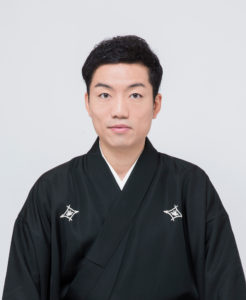 新内 多賀太夫(しんない たがたゆう)
新内 多賀太夫(しんない たがたゆう)
《新内節》
第22回(平成30年・2018年度)受賞者
Recipient of the 22nd JTCF Award for 2018
SHINNAI TAGATAYŪ (Shinnai-bushi)
[贈賞理由]
2017年に新内節の七代目冨士元派家元、新内多賀太夫を襲名し、4月の襲名披露公演では進境いちじるしい実力を発揮した。父の新内仲三郎(人間国宝)とともに新内節の現代を支える存在であり、さらに将来を担うことが期待される。
東京藝術大学では豊後系浄瑠璃を広く学び、博士論文により学位を取得したことも堅実な演奏の裏付けとなっている。また歌舞伎や新派等、他のジャンルや創作にも意欲的に取り組み、その才能は高く評価されている。日本の伝統文化の未来につながる活躍が大いに期待される。
[新内多賀太夫 プロフィール]
新内節冨士元派七代目家元。
1982年東京生まれ。6歳より父の新内仲三郎(人間国宝)に師事。
東京藝術大学音楽学部邦楽科を卒業し、同大学院博士課程を修了。
論文「琴(箏)を通した上調子の発生と発達」で東京藝術大学大学院音楽研究科三味線音楽専攻音楽学位(博士号)を取得。
歌舞伎や新派公演、国立劇場、三越劇場、紀尾井ホール主催公演等に出演。
深川江戸資料館では新内流しの再現を行う。また千代田区アーティストインスクールの講師となり、子供たちへの普及にも励む。新内協会理事。
2004年東京藝術大学常英賞、2009年第22回財団法人清栄会奨励賞、2013年第34回松尾芸能賞新人賞、2014年第68回文化庁芸術祭賞新人賞、2015年第65回芸術選奨文部科学大臣新人賞受賞。
創作曲に「寿猫」「乙姫」「因幡の白兎」「なみだ山~楢山節考~」「いろは曼荼羅~空海~」他。劇伴に「窯変源氏物語~夕顔、玉鬘、葵~」「謹訳源氏物語~桐壺、帚木~」「土御門大路」「新釈 金色夜叉」「居酒屋お夏」「深川年増」「明烏 AKEGARASU転生」「黒蜥蜴」他。歌舞伎では「マハーバーラタ戦記」や「世界花小栗判官」の一部を作曲。
Reasons for award:
Shinnai Tagatayū was appointed the seventh iemoto of the Fujimoto branch of the Shinnai-bushi genre, whereupon he assumed his current stage name. He demonstrated his extraordinarily forward-looking approach to his art at a concert held in April to mark his assumption of this role. Together with his father, the Living National Treasure Shinnai Nakasaburō, he is currently one of the two mainstays of the Shinnai-bushi genre and high hopes are held out for his future activity.
At the Tokyo University of the Arts he conducted extensive studies of the various genres of Edo-based narrative shamisen music known collectively as Bungo jōruri (including genres such as Tomimoto-bushi, Tokiwazu-bushi, Shinnai-bushi and Kiyomoto-bushi), and his solid performance style is underpinned by his academic achievement as represented by his doctoral dissertation. He is also actively involved in creative work in other genres such as the Kabuki and Shinpa theatres and has gained a high reputation for his work in this area. He is expected to make a major contribution to the future of Japanese traditional culture.
Profile of Shinnai Tagatayū:
Shinnai Tagatayū is the seventh iemoto in the Fujimoto branch of the Shinnai-bushi genre. Born in Tokyo in 1982, he began studying with his father, the Living National Treasure Shinnai Nakasaburō, at the age of six. He subsequently studied in the Department of Japanese Music in the Faculty of Music at the Tokyo University of the Arts. He gained his doctorate in musicology in the field of shamisen music in the Musical Research Department of the Tokyo University of the Arts graduate school with a dissertation entitled ‘The origins and development of the uwajōshi tuning with reference to the koto’. He has appeared on the Kabuki and Shinpa stages at theatres including the National Theatre, the Mitsukoshi Theatre and Kioi Hall. He is reviving the tradition of itinerant Shinnai-nagashi at the Fukagawa Edo Museum. He is also attempting to spread awareness of the Shinnai tradition among children through his work as instructor in Chiyoda ward’s ‘Art in Schools’ system. He is Director of the Shinnai Association.
He was awarded the Jōei Prize for Japanese traditional music at the Tokyo University of the Arts in 2004, the 22nd Encouragement Prize of the Seieikai Foundation in 2009, the New Artist Prize in the 34th Matsuo Performing Arts Awards in 2013, the New Artist Prize in the 68th Arts Festival sponsored by the Agency for Cultural Affairs in 2014, and the New Artist Prize of the Ministry of Education, Culture, Sports, Science and Technology in the 65th Arts Awards in 2015.
He has composed many pieces including Kotobuki neko (The Lucky Cat); Otohime (Princess Otohime); Inaba no shiro-usagi (The White Rabbit of Inaba); Namidayama: Narayama-bushi kō (Mountain of Tears: The Ballad of Narayama); and Iroha mandara: Kūkai (Iroha mandala: Kūkai). He has also composed music to accompany many theatrical productions including Yōhen Genji monogatari: Yūgao, Tamakazura, Aoi and Kinyaku Genji monogatari: Kiritsubo, Hahakigi (based on episodes from The Tale of Genji); Tsuchimikado ōji; Shinshaku konjiki yasha; Izakaya O-Natsu; Fukagawa-doshima; Akegarasu tenshō; and Kuro-tokage (Black Lizard). In the Kabuki theatre he has composed some of the music for the plays Mahabharata senki and Sekai no hana Oguri Hangan.